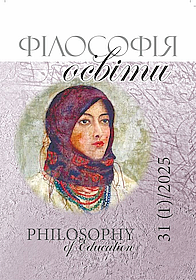Розробка методики оцінювання освітніх платформ в контексті інноваційно-дослідницької діяльності освітян
DOI:
https://doi.org/10.31874/2309-1606-2025-31-1-6Ключові слова:
методологія оцінювання, відкриті освітні ресурси, освітні платформи, цифровізація освіти, метод аналізу ієрархій, матриця парних порівняньАнотація
Стаття присвячена розробці універсальної методики оцінки якості сучасних освітніх платформ. У контексті глобальної цифровізації освіти зростає потреба у системному підході до аналізу ефективності, доступності та користувацького досвіду навчальних платформ. Автори пропонують методику, що враховує вісім ключових критеріїв: доступність та інклюзивність, зручність використання та інтерфейс, інтерактивність та залученість користувачів, підтримка користувачів та зворотній зв’язок, платність, адаптивність до індивідуального темпу навчання, багатомовність та локалізація і сертифікація.
Методологія дослідження базується на поєднанні кількісних і якісних методів аналізу, що забезпечує комплексність і об’єктивність оцінки. Особливістю запропонованого підходу є використання методу аналізу ієрархій для визначення вагових коефіцієнтів критеріїв, що підвищує наукову обґрунтованість результатів.
Важливим аспектом дослідження є орієнтація на потреби різних категорій користувачів, зокрема осіб з обмеженими можливостями, що робить методику дійсно інклюзивною. У статті розглянуто інструменти та підходи до оцінювання існуючих платформ на основі запропонованих критеріїв і методики, що має важливе прикладне значення для розробників і адміністраторів освітніх середовищ.
Результати дослідження будуть корисні для широкого кола фахівців: розробників освітніх платформ, дослідників у сфері цифрової трансформації освіти, викладачів та керівників навчальних закладів. Запропонована методика може стати основою для створення стандартів якості цифрових освітніх ресурсів та сприятиме розвитку сучасного освітнього середовища, доступного для всіх категорій користувачів. Стаття підкреслює важливість постійного вдосконалення освітніх платформ у зв’язку з динамічним розвитком цифрових технологій та зміною потреб суспільства.
Посилання
Baas, M., Van Der Rijst, R., Huizinga, T., Van Den Berg, E., & Admiraal, W. (2022). Would you use them? A qualitative study on teachers’ assessments of open educational resources in higher education. The Internet and Higher Education, 54, 100857. https://doi.org/10.1016/j.iheduc.2022.100857
Çakmak, T., Özel, N., & Yılmaz, M. (2013). Evaluation of the Open Course Ware Initiatives within the Scope of Digital Literacy Skills: Turkish Open CourseWare Consortium Case. Procedia – Social and Behavioral Sciences, 83, 65–70. https://doi.org/10.1016/ j.sbspro.2013.06.014
DeVries, I. (2013). Evaluating Open Educational Resources: Lessons Learned. Procedia – Social and Behavioral Sciences, 83, 56–60. https://doi.org/10.1016/ j.sbspro.2013.06.012
Khosravi, H., Denny, P., Moore, S., & Stamper, J. (2023). Learnersourcing in the age of AI: Student, educator and machine partnerships for content creation. Computers and Education Artificial Intelligence, 5, 100151. https://doi.org/10.1016/j.caeai.2023.100151
Lambert, S. R. (2019). Do MOOCs contribute to student equity and social inclusion? A systematic review 2014–18. Computers & Education, 145, 103693. https://doi.org/10.1016/j.compedu.2019.103693
Misut, M., & Pribilova, K. (2015). Measuring of quality in the context of e-Learning. Procedia – Social and Behavioral Sciences, 177, 312–319. https://doi.org/10.1016/ j.sbspro.2015.02.347
Web Content Accessibility Guidelines (2024). W3C Recommendation. 12 December 2024. https://www.w3.org/TR/WCAG22
##submission.downloads##
-
PDF (English)
Завантажень: 95
Опубліковано
Як цитувати
Номер
Розділ
Ліцензія

Ця робота ліцензується відповідно до Creative Commons Attribution 4.0 International License.
- Автори, які публікуються у цьому журналі, згодні з такими умовами:
- Автори зберігають авторське право і надають журналу право першої публікації;
- Автори можуть укладати окремі, додаткові договірні угоди з неексклюзивного поширення опублікованої журналом версії статті (наприклад, розмістити її в інститутському репозиторії або опублікувати її в книзі), з визнанням її первісної публікації в цьому журналі.





